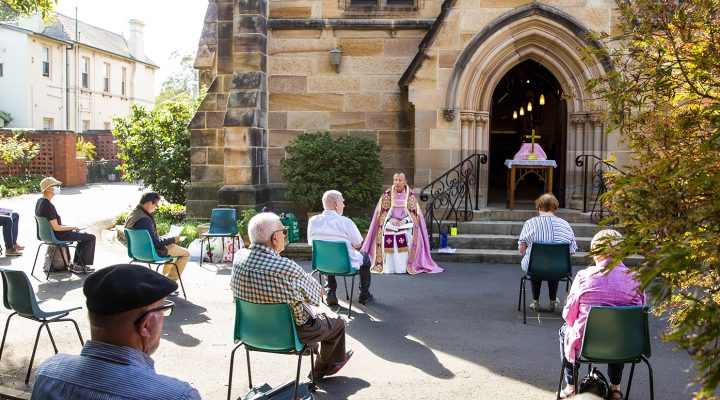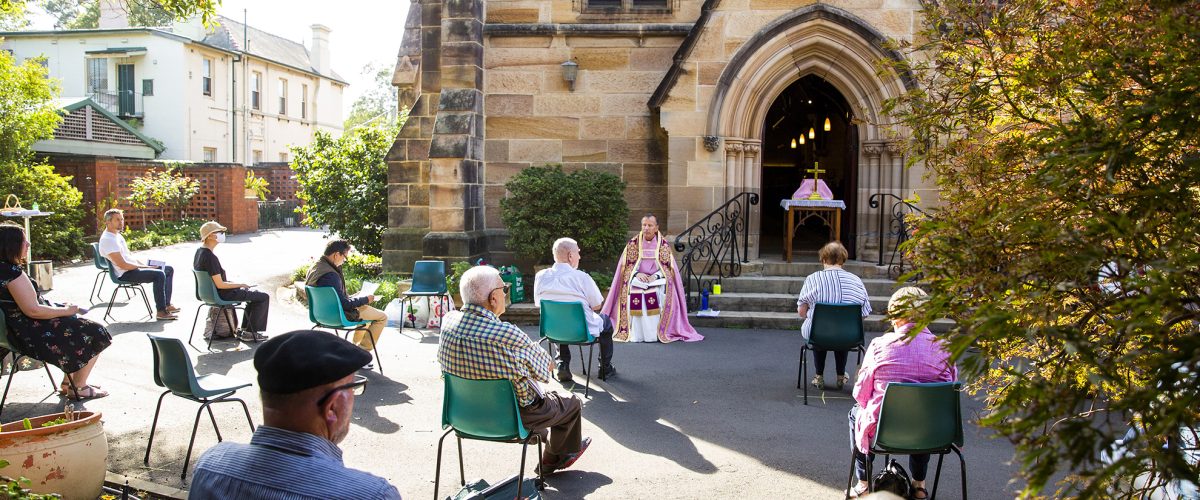Religious groups in nearly 25% of the world’s countries were subjected to government force to prevent in-person gatherings during the first year of the COVID-19 pandemic, and even more endured social hostilities and conspiracy theories blaming them for the spread of the coronavirus, Pew Research Center says in a new report.
“In more than a third of the 198 countries and territories analyzed, religious groups were subjected to various types of force or blame related to the coronavirus outbreak in 2020,” Pew explains in its 13th annual study of global restrictions on religion, released Nov. 29.
In some areas, private individuals or groups turned to acts of vandalism or physical violence against religious organizations, believing them to be responsible for the pandemic, the report says. “These incidents were spread fairly evenly around the world, including in 12 countries in the Americas (34% of countries in the region), 20 countries in the Asia-Pacific region (40%), 20 countries in Europe (44%), seven countries in the Middle East-North Africa region (35%) and 15 countries in sub-Saharan Africa (31%).”
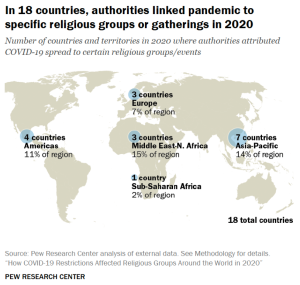
The study presents new analysis of the effects of pandemic-related health measures on religious groups the first year they went into effect. Pew said the research does not verify whether use of physical force was justified in each instance. Nor do the statistics include nations where limits or bans on religious gatherings were enforced with fines or other less severe methods.
But the report does determine that numerous governments attributed the pandemic to specific faith groups or gatherings: “Such incidents were reported in 18 countries (9% of the total analyzed). In some cases, religious groups were explicitly accused of having caused outbreaks, which the groups’ leaders said resulted in stigmatization, scapegoating or profiling.”
Such instances included Pakistani authorities blaming the spread of the virus on members of a minority Muslim sect as some of its members returned from a pilgrimage to Iran. In mostly Buddhist Cambodia, authorities drew special attention to Muslims by listing them separately in statistics for infection rates.
“And in Canada, Hutterites (an Anabaptist group living in communes throughout North America) claimed they faced social discrimination after provincial governments publicized COVID-19 outbreaks in their communities, which they said amounted to ‘cultural and religious profiling.’”
When governments resorted to force to impose compliance to pandemic-related regulations, it was most often through detentions, the researchers found. Worshipers and faith leaders were arrested and jailed in 40 of the 46 nations where government force was reported during the pandemic.
“In Azerbaijan, for example, police detained Shiite worshipers who had gathered in several cities to commemorate Ashura, an Islamic holiday, in violation of a ban on gatherings. In the United States, police in New Jersey arrested 15 at a rabbi’s funeral that violated the state’s ban on public gatherings. The arrests were made after some mourners became unruly and argumentative when police tried to disperse the crowd, according to media reports.”
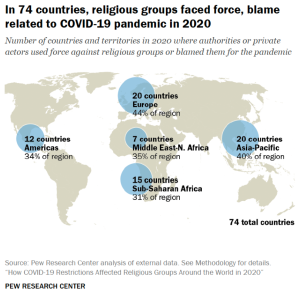 Governments resorted to physical violence against religious groups in 11 nations in 2020.
Governments resorted to physical violence against religious groups in 11 nations in 2020.
“In Comoros, Gabon and Nepal, police used tear gas to disperse religious gatherings that violated COVID-19 lockdown rules. In China, more than 300 members of the Church of Almighty God (also known as Eastern Lightning) were arrested in February and March 2020 during pandemic-related identification checks and home inspections, and some were subjected to beatings and electric shocks,” researchers found.
Authorities conducted raids or confiscated property to close down religious gatherings in 10 countries: “In Israel, police targeted Jewish communities deemed to be at the epicenter of outbreaks, deploying security forces in ultra-Orthodox neighborhoods, breaking up gatherings at synagogues and sending helicopters to hover low over crowds. In Mexico, authorities raided a church in the state of Durango during a clandestine Mass and expelled the worshippers.”
Religious leaders in four nations were deported to their native countries for violating COVID-19 restrictions while authorities in India, Indonesia and Yemen resorted to lethal force against religious groups that violated restrictions.
“Roughly a quarter or more countries in each major geographic region — with the exception of Europe — had instances where governments used one or more of these types of force when religious groups did not follow public health measures related to the COVID-19 pandemic,” the report states. “This includes 15 countries in sub-Saharan Africa (31% of countries in the region), 15 countries in the Asia-Pacific region (30%), six in the Middle East-North Africa region (30%) and nine countries in the Americas (26%). In Europe, only one country, Montenegro, fell into this category.”
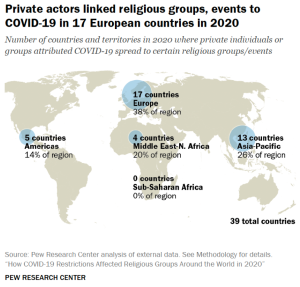 Pew also uncovered instances in 39 countries where non-governmental actors blamed faith groups for spreading COVID-19: “Private groups or individuals also used conspiracy theories or other inflammatory speech to blame specific religious groups for the spread of the virus.”
Pew also uncovered instances in 39 countries where non-governmental actors blamed faith groups for spreading COVID-19: “Private groups or individuals also used conspiracy theories or other inflammatory speech to blame specific religious groups for the spread of the virus.”
In many instances, local residents resorted to centuries-old tactics to disparage and accuse people of faith of creating public health challenges.
“In more than half of these countries (23 out of the 39), such comments were made against Jews,” the report states. “In France, social media users shared antisemitic tropes with caricatures of a former Jewish health minister that depicted her poisoning a well — an insinuation that Jews were responsible for the pandemic. (This trope dates back to the 14th century, when Jews were accused of spreading the Black Plague by poisoning food and wells, and they were the victims of mass killings.)”
In the United Kingdom, theories spread online about Jews being in control of pandemic lockdowns. A man in Morrocco was arrested for social media claims that Jews were infecting others with COVID-19.
“The sources also indicate that Muslims were targeted by private individuals or organizations in connection with the coronavirus outbreak in 15 countries (including some Muslim-majority countries),” according to the report.
Christians also have been the focus of conspiracy theories, Pew added. “In Turkey, an Armenian Orthodox church’s door was set on fire, and news reports said the man told police that he acted because ‘they (Armenian Christians) brought the coronavirus’ to Turkey. In Egypt, conspiracy theories blamed the pandemic on the Coptic Orthodox Christian minority, which international Christian observers said exacerbated the discrimination the minority group already faced.”
Pew said it also examined cases of religious groups criticizing regulations. “During 2020, religious groups in 54 countries (27% of all analyzed) criticized public health measures related to COVID-19 — such as restrictions on public gatherings — and in many cases alleged that the measures violated their religious freedom,” according to the study’s sources.
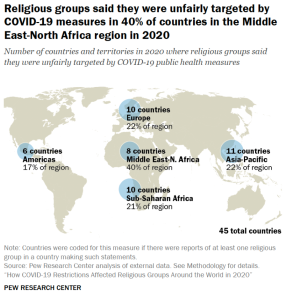 The study identified 69 nations, representing 35% of all those examined, where at least one religious group or leader defied governmental COVID-19 restrictions.
The study identified 69 nations, representing 35% of all those examined, where at least one religious group or leader defied governmental COVID-19 restrictions.
“In the United States, a pastor in Louisiana held services at his church in defiance of stay-at-home orders by the governor, telling hundreds of attendees they had ‘nothing to fear but fear itself.’ Meanwhile, in Australia, groups of ultra-Orthodox Jews met for prayer in a private courtyard in Melbourne in violation of a national ban on gatherings at places of worship (and against a similar directive by local Jewish leaders).”
In 45 nations, religious groups responded with assertions they were treated unfairly by government COVID-19 measures.
“In many of the complaints and protests around the world, religious groups also claimed that pandemic-related laws and regulations unfairly targeted them either by comparison with nonreligious businesses and institutions, such as shops and restaurants, or relative to other religious groups,” Pew found.
But Pew said it also found many instances of cooperation between governments and faith groups in combatting the pandemic.
“In addition, religious leaders or groups in 94 countries (47% of all those analyzed in the study) encouraged followers to worship at home, promoted online worship, or engaged in other efforts to stop the spread of the virus, such as mask wearing and social distancing.”

